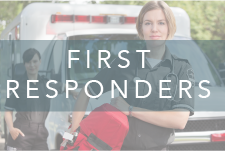First responders are the guardians of their communities, providing both physical protection in times of disaster and the mental and emotional fortitude to inspire safety and confidence in those around them. However, these powerful notions come at a cost, and the feeling of always having to be the protector of an entire community can be a major source of stress. First responders are regularly exposed to trauma, all while being expected to continue embodying a stoic, undaunted visage.

As a result, self-medicating this stress with drugs or alcohol is common. It can lead to the development of addiction if one continues trying to balance their emotional needs and the unrealistic images set upon them alone. However, while addiction in first responders requires a unique and specialized approach, recovery is possible. Finding the right program is essential for addressing this complex situation and finding the best path of recovery for those who continue to serve.
The Unique Perspective of First Responders
First responders are exposed to many unique and traumatic situations on a regular basis. Having peers and professionals who understand this perspective is essential for developing an effective recovery plan. Many individuals may suffer from a traumatic experience in their life. However, it is incredibly concerning if an individual is repeatedly exposed to traumatic events while still being trained and expected to jump back into the fray, even if future traumas await. Understanding this unique mentality surrounding one’s use of addictive substances is paramount for informing proper coping and recovery techniques.
The prevalence of addiction, trauma and mental health disorders in first responders is something that needs to be openly addressed. However, first responders may not be comfortable with vulnerability, making it difficult to embrace many aspects of recovery.
As a first responder, one may be tasked with the role of a guardian or protector who is always ready to help others and may have difficulty relinquishing this mentality to begin helping themselves. Having a mindset of service can make focusing on one’s internal struggles, or even the idea of self-care practices, foreign and enigmatic. Addictive substances can ingratiate their use as a result of this mentality.
The Need for a Specialized Program
Addressing addiction and beginning a recovery program designed for first responders can be a barrier on its own. Because of a first responder’s unique position and perspective, generalized recovery programs may leave many aspects of their experience unaddressed. It can be difficult to release their role as a protector if they are in a group that does not share a similar perspective. Creating a community of first responder peers is much more effective in addressing the unique struggles of their situation.
Even in a group session, if a first responder still feels the need to be a guardian or that they are surrounded by those who cannot understand their situation, feelings of isolation and resistance can continue to manifest. Rather, engaging in a specialized recovery program that understands and is focused on the unique plights of first responders can create an effective community and atmosphere. This environment can help confront this complex and difficult recovery journey while allowing first responders to communicate in a language that is shared and understood by all.
Beginning Recovery With Six Dimensions of Wellness
The unique position of first responders is best addressed in a community of understanding and motivated peers all working towards their own healing in many dimensions of their lives. Embracing the six dimensions of wellness in a specialized recovery program alongside professionals and peers can provide the sense of camaraderie needed to begin tackling addiction. These six dimensions are:

Daily Health: Developing one’s daily routines, self-care practices, and balancing daily financial aspects of life.
Relationship Health: Embracing like-minded support groups, sponsors, role models, and learning to develop positive relationships while incorporating effective personal boundaries.
Family Systems: Focuses on one’s immediate familial unit to develop healthy relationships, boundaries, and communication strategies while incorporating elements of accountability, honesty, and trust for the whole family.
Mental and Emotional Wellness: Addresses coping with diagnosis, motivation, and the journey to self-acceptance while increasing one’s emotional resiliency and awareness.
Physical Health: Focuses on one’s physical needs, from physical activity and dietary needs to pain management
Spiritual Health: Practices mindfulness and evaluates values, priorities, awareness, ego, and the implementation of faith and spirituality
Tackling the Mentality Instead of the Behavior
Addressing addiction in first responders involves addressing the mindset behind one’s actions rather than only tackling individual behaviors. Having a community that understands the difficult underlying emotional aspect of addiction and how it relates to a first responder’s experience can help aid the recovery process.
Being able to express oneself to others without having to find all the right words can be a relief, and aid to an air of community and understanding. This can permeate to address the shared mentality behind one’s actions. Addressing the core, underlying components of addiction, one’s environment, and rebuilding a new mentality are instrumental in adjusting one’s behaviors in order to grow and develop.









